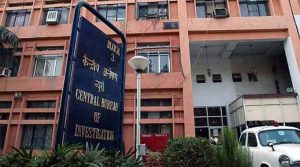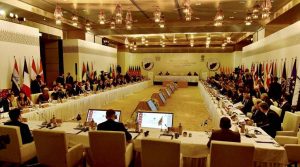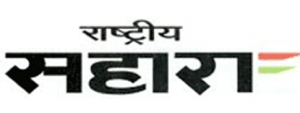
06-12-2016 (Important News Clippings)
To Download Click Here
Save Afghanistan
Heart of Asia conference openly criticises Islamabad’s sponsorship of terrorism
Last weekend’s Heart of Asia (HoA) conference in Amritsar will go down as one of those rare moments in international diplomacy when a participating country is openly embarrassed by fellow members of the process. The conference – meeting to coordinate efforts for peace and development in Afghanistan – saw Pakistan being called out for supporting terrorists who are not only undermining Afghan security but also destabilising the region as a whole. In fact, Afghan President Ashraf Ghani openly chastised Pakistan when he stated that Islamabad’s pledge of $500 million for Afghan reconstruction could be better used for containing extremism with roots in Pakistani soil.
There’s no denying that Pakistan holds the key to the situation in Afghanistan. Islamabad has long played the game of leveraging Afghan territory for strategic depth through extremists like the Taliban. This is of a piece with Pakistan’s strategy of using terrorism to offset the size and power gap with India, no matter that it destabilises the entire region and throws it off from the war South Asian nations should really be waging: a war against the mass poverty that blights them all.
In this regard, the HoA Amritsar declaration did well to name all the terrorist groups that threaten peace and security in Afghanistan and the region. And for the first time this list included Lashkar-e-Taiba and Jaish-e-Muhammed. Taken together, much pressure was brought to bear on Pakistan. Similar pressure has been brought to bear before, without substantive result. Nevertheless, with new Pakistani army chief General Qamar Bajwa taking over from the viscerally India-hating Raheel Sharif, perhaps there is a modicum of hope that Pakistan’s sponsorship of terrorism will abate. Only time will tell. It may be wise for New Delhi to cut Islamabad some slack at the moment, while keeping its guard and international pressure up.
कैशलेस की अड़चनें
नोटबंदी के समय नकली नोटों से छुटकारा मिलने, आतंकवादियों की फंडिंग रुकने और काले धन पर करारी चोट पहुंचने का दावा किया गया था लेकिन अब इस अभियान का केंद्र भारत को नकदी-रहित अर्थव्यवस्था बनाना हो गया है। देश में नकदी-रहित अर्थव्यवस्था को प्रोत्साहन देने वाला भौतिक ढांचा या कानूनी ढांचा नहीं होने जैसी अनेक खामियां हैं। भारतीय रिजर्व बैंक के मुताबिक बैंकों की केवल 38 फीसदी शाखाएं ही ग्रामीण इलाकों में हैं। पिछली जुलाई तक हर पांच में से चार गांवों और हर तीन में से एक कस्बे में कोई बैंक नहीं हैं। पूरे देश के 593,000 गांवों के लिए केवल 120,000 बैंकिंग प्रतिनिधि हैं।
यानी ग्रामीण और कस्बाई इलाकों में रहने वाली 60 करोड़ से भी अधिक आबादी की बैंकों तक पहुंच नहीं है। इसी तरह 30 करोड़ से भी अधिक वयस्क आबादी के पास कोई बैंक खाता नहीं है। देश की करीब 94 फीसदी वयस्क आबादी के पास आधार कार्ड होने का अनुमान है। लेकिन 6 करोड़ वयस्क लोग अब भी ऐसे हैं जिनके पास बैंक खाते खुलवाने लायक कोई दस्तावेज नहीं हैं। हालत यह है कि ग्रामीण इलाकों में सक्रिय बैंकों के लिए कोर बैंकिंग जैसा काम भी कर पाना मुश्किल हो जाता है क्योंकि बिजली आपूर्ति काफी अनियमित है। एटीएम के संचालन में भी इसी तरह की व्यावहारिक परेशानियां आती हैं। इंटरनेट कनेक्शन की हालत खराब होने से वहां ऑनलाइन लेनदेन काफी मुश्किल हो जाता है।प्रधानमंत्री नरेंद्र मोदी नोटबंदी के बाद से ही लोगों से लगातार अपील कर रहे हैं कि वे बैंकिंग सेवाओं के लिए अपने मोबाइल फोन का इस्तेमाल करें। लेकिन ग्रामीण क्षेत्रों में संचार घनत्व केवल 51 फीसदी होना यह संकेत दे देता है कि ग्रामीणों की एक बड़ी संख्या अब भी फोन से वंचित है।
भारत में इस समय जो 90 करोड़ मोबाइल फोन हैं उनमें से 65 करोड़ तो फीचर फोन हैं और मोबाइल लेनदेन के लिए जरूरी स्मार्टफोन की श्रेणी में केवल 25 करोड़ फोन ही आते हैं। ग्रामीण इलाकों में स्मार्टफोन की पहुंच काफी कम होने से यूपीआई या मोबाइल वॉलेट के इस्तेमाल की संभावना ही खत्म हो जाती है। देश भर में करीब 35 करोड़ इंटरनेट कनेक्शन हैं लेकिन उनमें भी शहरी क्षेत्र हावी हैं। व्यावसायिक प्रतिष्ठानों में कार्ड स्वाइप करने वाली पीओएस मशीनों की संख्या पूरे देश में केवल 14 लाख है और अधिकांशत: शहरी इलाकों में ही उनका संकेंद्रण है। प्रति 10 लाख आबादी पर पीओएस मशीनों की संख्या केवल 693 है जो दुनिया में न्यूनतम पीओएस अनुपात में से एक है। चीन में यह अनुपात 4,000 और ब्राजील में 33,000 पीओएस प्रति 10 लाख है। जहां तक पेटीएम जैसे मोबाइल वॉलेट का सवाल है तो वे प्रत्येक लेनदेन पर 2 फीसदी का कमीशन वसूलते हैं। खास तौर पर छोटे कारोबारियों के लिए तो यह काफी महंगा सौदा होगा। भौतिक ढांचे में इन कमियों के साथ ही भारत के पास मजबूत डेटा सुरक्षा कानून भी नहीं है। पिछले कुछ महीनों में ही ऑनलाइन डेटा चोरी करने के कई मामले सामने आ चुके हैं। डेटा प्राइवेसी कानून भी नहीं होने से यह खतरा बना हुआ है कि मोबाइल लेनदेन से हासिल डेटा को कंपनियां बाद में दूसरों को भी बेच सकती हैं।सरकार इनमें से कुछ खामियों को दुरुस्त करने की कोशिश कर रही है। फीचर फोन पर भी बुनियादी बैंकिंग सेवाओं की सुविधा देने वाली यूएसएसडी तकनीक अपनाने के लिए सरकार मोबाइल कंपनियों पर काफी जोर डाल रही है।
सरकार ने पीओएस मशीनों पर लगने वाले उत्पाद शुल्क को भी कम कर दिया है। नकदी-रहित लेनदेन को बढ़ावा देने के तरीके सुझाने के लिए मुख्यमंत्रियों की एक समिति भी बनाई गई है। इन उपायों से वह सवाल एक बार फिर उठ खड़ा होता है कि क्या सरकार नोटबंदी के पहले ऐसा नहीं कर सकती थी? सच तो यह है कि ग्रामीण और कस्बाई इलाकों में नकदी-रहित लेनदेन अपनाने में खासा समय और भारी निवेश लगेगा।
The limits of anger
From Heart of Asia meet, a reminder: India needs a creative strategy and roadmap to deal with Pakistan.
The acid remarks made by President Ashraf Ghani in his inaugural address at the Heart of Asia summit in Amritsar on Sunday illustrate the growing rage over Pakistan’s crisis-inducing policies in the region. Thanking Pakistan for its $500 million pledge to help rebuild Afghanistan, the Afghan President suggested the country instead use the money “for containing extremism, because without peace, any amount of assistance will not meet the needs of our people”. The decidedly undiplomatic tenor of Ghani’s remarks was seconded by his co-chair, Prime Minister Narendra Modi, who told the regional leaders gathered in Amritsar that “silence and inaction against terrorism in Afghanistan and our region will only embolden terrorists and their masters”. Prime Minister Modi, for his part, has brushed aside widespread speculation of a meeting with Pakistan’s envoy, Sartaj Aziz. No one can dispute the legitimacy of the sentiments that underpin these actions. The question that needs to be asked, though, is if either government — and others like them, worried by Pakistan’s use of jihadists as proxies for its geopolitical interests — actually has a roadmap to deal with the problem.
Prime Minister Modi’s security advisors have a point when they argue against reflexive calls for dialogue with Pakistan. Talking, after all, is simply a tool; like all tools, it guarantees no particular results. Having said that, though, New Delhi needs to ask itself if disengagement is a useful policy, either. The experience of the weeks since the cross-LoC raids, which followed the Uri attack, ought to have made clear even to dyed-in-the-wool government supporters that Pakistan has not been deterred from backing jihadist operations in Kashmir. The raids did introduce elements of uncertainty into Pakistan’s military calculations — but the uncertainties are not so large as to lead the generals to change their approach. The bottom line is this: India’s actions have simply replaced one equilibrium on the LoC with another, somewhat bloodier one.
Disengagement, just like engagement, will offer no results unless it is part of a creative strategy. New Delhi does have tools at its disposal, which rage should not lead it to throw away. India could, for example, be far more vigorous in its engagement of Pakistan’s civil society, rather than unite the entire country behind the generals through mindless hawkishness. It could do much more to revive its ties with Russia and the central Asian states — important actors in the regional chessboard, but for years now relative backwaters for Indian diplomacy. It could look for new ways to work with China in the shared objective of stability in Afghanistan and West Asia. The point is simple: Anger may be a satisfying emotion, but it is not a strategy.
A roadmap for the CBI
The investigative agency must proceed against its own erring officers and liberate itself from red-tapism
 The Central Bureau of Investigation (CBI) will have a new interim chief, Rakesh Asthana, to steer it through what are likely to be difficult times. Mr. Asthana is not new to the fight against corruption, having handled a number of sensitive cases, including those against Rashtriya Janata Dal chief Lalu Prasad. He may not be the senior-most officer in India among those statutorily eligible for the post, but he has the credentials to be confirmed as the permanent director when a regular arrangement is made.
The Central Bureau of Investigation (CBI) will have a new interim chief, Rakesh Asthana, to steer it through what are likely to be difficult times. Mr. Asthana is not new to the fight against corruption, having handled a number of sensitive cases, including those against Rashtriya Janata Dal chief Lalu Prasad. He may not be the senior-most officer in India among those statutorily eligible for the post, but he has the credentials to be confirmed as the permanent director when a regular arrangement is made.
However glamorous the job may be, being director of the CBI is to wear a crown of thorns. You are constantly in the public glare and under scrutiny by the media. Perched at dizzying heights of administration, you have access to the Prime Minister on a daily basis. Your relationship with the Prime Minister is delicate: you need to keep him or her informed of all the major issues concerning the organisation while at the same time be conscious of the fact that you are on your own while overseeing investigations. You are answerable to the law and the law alone.The CBI requires a mature head. A megalomaniac can wreck the system and embarrass everyone by acting unilaterally and recklessly, which would be out of tune in a democracy like ours. Such a person nearly made it to the job once earlier. Fortunately, the checks and balances in our system prevented this catastrophe. However powerful a CBI director may be under the law, he or she would be ill-advised to defy the canons of democracy.
Undoing wrongs
Mr. Asthana has to unfortunately first concentrate on undoing the damage caused by a few of his predecessors. The Enforcement Directorate has recently reported adversely against two former CBI chiefs. This is painful to hear. Mr. Asthana has to take cognisance of this and take appropriate action. Only then will public confidence in the CBI as a fearless agency that will not hesitate to proceed against its own erring personnel be restored.
There have been many reports about dishonesty and harassment of the public by those at the cutting edge in the CBI. This is not a new phenomenon, but the volume and intensity of allegations of misconduct on the part of investigating officers has lately become strident. Mr. Asthana has his job cut out for him in this area. Stringent action against misbehaving staff in the agency will be in tune with the Prime Minister’s drive against dishonesty in high offices. There will be ample public support for this endeavour.
Criticisms of the CBI
There are two big sticks with which the CBI is beaten ad nauseam. The first is its vulnerability to political pressure. Criticism on this score cannot be dismissed as wholly motivated or as a manifestation of the crudity of politics. There is a measure of truth in this charge of politicisation of the investigation agency. However, less than 10 per cent of the cases handed over to the CBI have political overtones, and this is what gives the organisation a bad name. The new chief should have a team of reliable deputies who can ensure with a toothcomb that investigations are insulated from external pressures. This will go a long way in restoring the CBI’s credibility. Even under such a strict regimen, allegations may still float around. Even a fabled agency such as the Federal Bureau of Investigation was recently under fire while investigating cyber misconduct by Democratic presidential candidate Hillary Clinton. Such events can be disconcerting but they cannot be allowed to distract or disturb the equanimity of a CBI chief. Ultimately, it all boils down to honest and fearless leadership.
The second stick is the one that relates to enormous delays in concluding investigations. As one former Central Vigilance Commissioner put it, the CBI is a black hole. Nothing that goes in ever comes out of it. This comment, stripped of its light-heartedness, is valid, and is analogous to the situation that prevails in the rest of the criminal justice system. There is an obligation on the part of every CBI director to explore all possible avenues to speed up investigation. This is more easily said than done, but there are ways of making it possible. Taking up select cases is one way. But then there is no professional alternative agency at the Centre to which the less important cases can be diverted. The need, therefore, for expanding the CBI’s infrastructure, especially its manpower, is vital. The Prime Minister can help greatly in this area by injecting a liberal outlook into the Department of Personnel and Training that provides administrative support to the CBI.
The CBI is not really popular among the youth who are looking for Central government employment through the Union Public Service Commission examination route, other than those appearing for the All India Services, including the Indian Police Service. This makes a case for a fresh look at the service conditions for direct recruitment to the CBI. A lot has been done in this area over the years, but much more is needed. Traditional thinking should be shed and red-tapism has to be cut ruthlessly in order to recruit more and generously improve emoluments (outside the rigid government pay structure) of the eternally demoralised direct recruits. I would strongly commend the Central Intelligence Agency practice of going to campuses and selling the idea to our young men and women that a job in the CBI has its rewards as well as exciting challenges.
Dependence on State governments
Another great constraint on the CBI is its dependence on State governments for invoking its authority to investigate cases in a State, even when such investigation targets a Central government employee. Since police is a State subject under the Constitution, and the CBI acts as per the procedure prescribed by the Code of Criminal Procedure (CrPC), which makes it a police agency, the CBI needs the consent of the State government in question before it can make its presence in that State. Such consent can be a case-by-case authorisation or a blanket approval of a class of offences. This is a cumbersome procedure and has led to some ridiculous situations, including the withdrawal of notifications of empowerment by some dishonest State governments. I cannot foresee any possibility even in the distant future of a constitutional amendment that places police in the Concurrent list. This is why many CBI directors in the past suggested the promulgation of a CBI Act that is on par with the Customs Act or the Income Tax Act, so that CBI officers enjoy independent powers of investigation — outside the CrPC — without having to be be at the mercy of State governments. A number of drafts for such an enactment are gathering dust in the Central Secretariat in Delhi. It is time to drum up political support for this crucial proposal. Why this has not found favour till now is perhaps the irrational fear that the CBI will become far too autonomous and powerful. Persons who peddle this argument obfuscate the truth that an autonomous CBI is not one that is devoid of accountability.
(R.K.Raghavan is a former CBI Director.)
आतंक के विरुद्ध एक
हार्ट ऑफ एशिया सम्मेलन आतंकवाद के विरु द्ध एकजुट कार्रवाई की घोषणा के साथ समाप्त हो गया। अमृतसर में आयोजित इस दो दिवसीय सम्मेलन में 40 से ज्यादा देशों के प्रतिनिधियों का भाग लेना ही इसके महत्त्व को दर्शाता है। यूरोपीय संघ भी इसका एक भागीदार है। हार्ट ऑफ एशिया मंच का मकसद अफगानिस्तान में शांति बहाली की प्रक्रिया को मजबूत करना तथा उसके पड़ोसी विशेषकर दक्षिण और मध्य एशिया के देशों के साथ आर्थिक, राजनीतिक और सुरक्षा को लेकर आपसी सहयोग बढ़ाना है। इसकी शुरु आत इंस्ताबुल से 2011 में हुई। पिछले वर्ष यह सम्मेलन इस्लामाबाद में हुआ था और उसमें विदेश मंत्री सुषमा स्वराज ने शिरकत की थी। वर्तमान सम्मेलन ऐसे समय हुआ जब पाकिस्तान के साथ हमारे संबंध बुरे दौर से गुजर रहे हैं।
अफगानिस्तान में शांति का दारोमदार बहुत कुछ पाकिस्तान पर निर्भर करता है। इस कारण कुछ लोगों का मानना था कि भारत को इस मंच का उद्देश्य आतंकवाद के मामले पर पाकिस्तान को अलग-थलग करने के लिए करना चाहिए था। पाकिस्तान में प्रधानमंत्री के विदेश मामलों पर सलाहकार और व्यावहारिक में विदेश मंत्री सरताज अजीज भी इस सम्मेलन में शिरकत कर रहे थे। अगर इस सम्मेलन की थीम एशिया में आतंकवाद, कट्टरता और उग्रवाद के बढ़ते खतरे से निपटना, सुरक्षा और संपन्नता था तो इसके केन्द्र में पाकिस्तान ही हो सकता है। लेकिन मेजबान देश होने के नाते भारत को कूटनीतिक मर्यादाओं का पालन करना था।
इसलिए ही प्रधानमंत्री नरेन्द्र मोदी ने पाक का नाम न लेते हुए अफगानिस्तान में शांति के लिए आतंकवाद के खिलाफ कार्रवाई तथा उसके लिए सभी के एकजुट होने का आह्वान किया, आतंकवादी समूहों में नवजवानों की भर्ती को रोकने आदि की जरूरत पर बल दिया तो उसका इशारा पाकिस्तान ही था। हमें इसे द्विपक्षीय विवाद का मंच नहीं बनाना था। यह काम औपचारिक तरीके से अफगानिस्तान के राष्ट्रपति अशरफ गनी ने किया। उन्होंने पाकिस्तान पर तीखा हमला बोलते हुए अफगानिस्तान में अशांति के लिए उसे जिम्मेवार ठहराया। तो अफगानिस्तान पर सम्मेलन और वहां के राष्ट्रपति द्वारा पाकिस्तान की उपस्थिति में उसे दोषी ठहराने के बयान से हमारा उद्देश्य पूरा हो जाता है। आखिर जो देश वहां उपस्थित थे, उन सबकी सहमति से जारी घोषणा पत्र इसका प्रमाण है कि भारतीय कूटनीति किस तरह सफल रही है।




